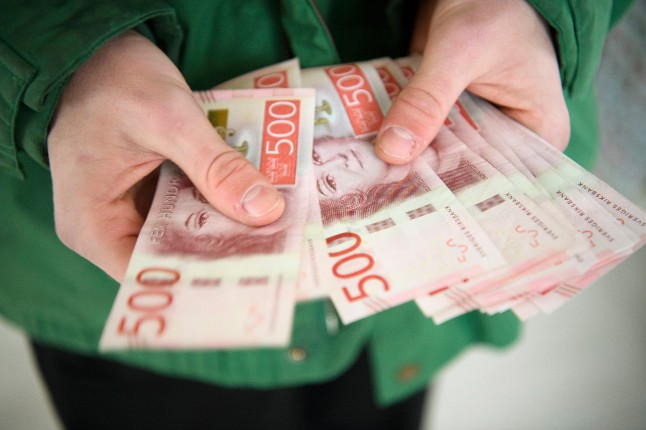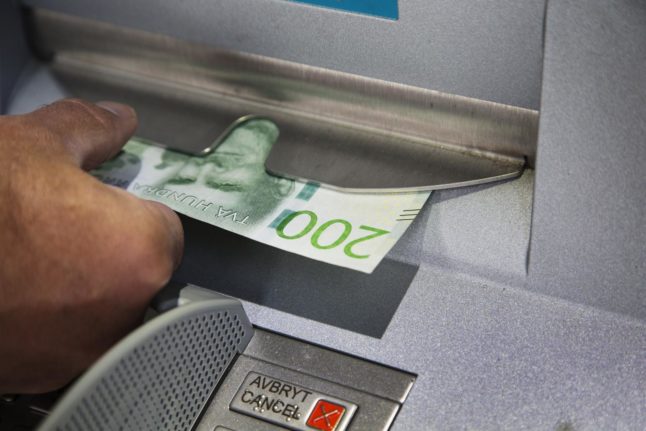Flush with cash?
According to Arturo Arques, private economist with Swedbank, somewhat paradoxically, a year of pandemic has left many people in Sweden better off.
“In 2020, a lot of people were still employed, and they haven’t spent as much as they normally do, because of all the restrictions. So many people have more money today than a year ago. They have larger savings,” he told The Local.
This is even before changes to taxes, salaries and prices, which, according to his analysis, will leave most households with higher disposable incomes this year, compared to in 2020.
According to Swedbank’s 2021 household economy paper, those living in rented accommodation have done better than those who recently bought property, due to the 13 percent appreciation in house prices last year. Changes to the top rate of unemployment benefits has helped middle income people who have lost their jobs, while pensioners and students are less well-off.
According to the bank’s analysis, a person living alone in a one-bedroom rented apartment, had 200 Swedish kronor more to spend a month in real terms this January than they did in the same month in 2020, a two-child, double-income family in a rented apartment had 150 kronor more to spend. If their children are over 16 that rises to 630 kronor.
For recent buyers, the picture is less rosy, with the rise in house prices meaning that they will be 1,170 kronor worse off than they would have been in January 2021.
“We have rapidly increasing house prices, and whether that trend continues or slows down will have a big impact on a lot of people,” Jens Magnusson, private economist at the SEB bank, told The Local. “A huge downside with the housing market that we’ve seen the last few years is that a lot of people are shut out, because they simply can’t afford it.”
What will happen to Sweden's property market in 2021? https://t.co/7gFOvBFmnf
— The Local Sweden (@TheLocalSweden) January 18, 2021
With Sweden’s student loans and housing allowances practically stagnant on last year, students who receive student funding in Sweden will this year have 140 kronor less a month to spend in real terms. A miserly increase in the guaranteed state pension has also left the poorest pensioners 220 kronor worse off a month.
For the unemployed, the situation has improved somewhat, given the increase in the maximum monthly A-kassa unemployment payment from 20,000 to 26,400 kronor. This will only help those for whom 20,000 represented less than 80 percent of their former salary, however.
Will salaries rise?
The pandemic has given employers, both in Sweden and internationally, good reasons to suspend wage increases, and for some time the slow rate of wage increase has been a concern in Sweden.
“The Riksbank [Sweden’s central bank] has repeatedly said that wages need to come up more for us to have a better functioning economy and higher inflation,” Magnusson said. “Obviously, during the pandemic you have negative growth rates in many countries in Europe, and that has not been good for for wages. But when we’re in a recovery, perhaps in the second half of this year and through 2022, that should be a good time for wage increases.”
What tax changes will benefit people?
Last year’s tax cuts effectively reduced the top marginal rate of tax in Sweden from 57 percent to about 50 percent, saving those on the highest incomes tens of thousands of kronor. This year, the biggest tax change is on income earned by retirees who take a part-time job.
“We have seen tax cuts for retirees and certain groups,” Magnusson said. “If you’re a working retiree, which are the those who are benefited the most, it might be a bit more than 1,000 kronor per month. Nowadays, in Sweden, if you are above 66 but continue to work, then you pay very little tax and keep a lot of your income.”
However, he said that the viewing the economy as a whole, these tax cuts were “too moderate to really matter”.
READ ALSO:
- 2021 forecast: Vaccination progress will determine Sweden’s economic outlook
- The law changes that come into force in Sweden in 2021
What will happen to the Swedish krona?
Many foreigners living in Sweden have savings or even receive their salary in another currency, meaning their spending power can change dramatically due to currency fluctuations.
The Swedish krona has depreciated against the pound, dollar and euro since about 2011, thanks in part to the Riksbank’s negative interest rates. But in 2020, that trend reversed, decreasing the spending power of those paid in these currencies.
Here is our guide to manage and maximise your Swedish pension, even if you don't intend to stay here permanentlyhttps://t.co/xGHrprNg7U
— The Local Sweden (@TheLocalSweden) March 6, 2021
Magnusson said he believed that the krona’s rise had further to go.
“Our view is that even though the krona has appreciated, it still has some way to go,” he said. “Obviously, if we go back into a turmoil situation where vaccination is not going as planned, or we have mutations of the virus, then we know that the Swedish krona and other small currencies are typically abandoned on the FX [currency exchange] market. But if things proceed the way we think, and we have economic recovery this year and next year, we think the krona will appreciate slightly.”
Arques said that the Swedish government’s successful management of the economy both before and during the pandemic, suggested that the krona would continue to rise in value.
“Because of the way the government and the central bank has managed the economy here in Sweden, we haven’t been as hurt as many other countries, and that’s one reason why the krona is quite strong compared to where it was a year or two ago. And if you look at how the economy looks in Spain, Italy, France, and England, there’s a good probability that the krona will will stay quite strong.”
Will inflation return?
The enormous $1.9 trillion stimulus package recently passed in the US, and similar packages in Europe, have led some to worry that the global economy might once again start to see the inflation that was such a problem in the 1930s, 1970s and 1980s.
Neither Arques or Magnusson believed that this would affect Sweden in 2021.
“This is an issue that has come up now for the first time in a long time. We’re talking about inflation risks again,” Magnusson said. “There are some worries that the US stimulus package might be a bit too big, and also maybe a bit too late, so maybe it will kick in when the economy is already recovering and that could in itself cause inflation.”
But he said that there were sufficient deflationary pressures in Sweden to keep price rises under control in the near term.
“We don’t see it as an immediate threat, especially not in Europe or in Sweden, because there are so much other things that are working in the opposite direction, so it’s not top of mind,” he said. “I don’t think households need to withdraw their money from the stock markets or try to hedge for inflation.”
Will we see a spending splurge after the summer?
Arques believes that the pent-up desire to travel or eat out will see a rise in spending once the pandemic is sufficiently over for restrictions to be lifted around the world.
“I think that the people that have not lost their jobs and who during the pandemic have not been able to spend as much as they usually do, they will probably increase their spending when the restrictions are lifted,” Arques said. “I think that they will start to travel as soon as they can. And people with modest or good salaries that used to go to restaurants, they will also start to do that as soon as they can.”



 Please whitelist us to continue reading.
Please whitelist us to continue reading.
Member comments